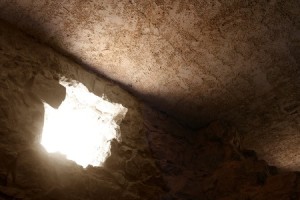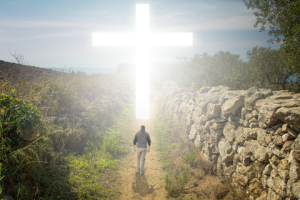Light in the Spiritual Darkness
In his commentary on Matthew, Craig Blomberg thought that no other religious discourse in history has attracted the attention devoted to the Sermon on the Mount. Both Christians and non-Christians alike have admired the teaching contained here. Leo Tolstoy believed the Sermon on the Mount was the true gospel of Christ and centered his book, The Kingdom of God is Within You on what it taught. Both Gandhi and Martin Luther King were influenced by Tolstoy’s teachings on nonviolence in that work. Gandhi reportedly said that when he read the Sermon on the Mount, it “went straight to my heart.” Dr. Bob, one of the cofounders of Alcoholics Anonymous (A.A.), said that the Sermon on the Mount was one of the “absolutely essential” passages of Scripture in the early days of A.A., before the Big Book was written. It is this last association that I want to explore here.
According to Sinclair Ferguson, the Sermon on the Mount is not about an ideal life in an ideal world. Rather, it is about “kingdom life in a fallen world.” In a similar way, the 12 Step recovery program is about sober life in a drinking world. Whether you are trying to live out a kingdom life or a sober life, they both call for radical lifestyle changes within their respective worlds.
At times, there has been some cross-pollination between those two worlds. When Bill W. introduced Sam Shoemaker at the 20th anniversary convention for A.A., he said that “It is through Sam Shoemaker that most of A.A.’s spiritual principles have come.” In his talk, Shoemaker said he thought the great need of our time was for a vast, world-wide spiritual awakening. He believed that A.A. was one of the great signs of that spiritual awakening. He thought that A.A. had indirectly derived its “inspiration and impetus” from the insights and beliefs of the church. And he hoped the reverse would be true. “Perhaps the time has come for the church to be reawakened and revitalized by the insights and practices found in A.A.”
The Sermon on the Mount seems to be one of those places where A.A. was cross-pollinated with some of the insights from Scripture. Here are a few examples. In the Big Book, Alcoholics Anonymous, it says that resentment is a “number one” offender. “It destroys more alcoholics than anything else. From it stem all forms of spiritual disease.” Three separate sections of the Sermon on the Mount could be relevant. There is one on anger (5:21-26); one on retaliation (5:38-42); and one on loving your enemies (5:43-48). Oh, and one of the Beatitudes (5:7): “Blessed are the merciful, for they shall receive mercy.”
The A.A. website said there is nothing concrete to point to when or where the saying “one day at a time” became one of the slogans of A.A. It could have originated with the Oxford Group; or it could have been originated with Bill and Dr. Bob. In the A.A. book, Dr. Bob and the Good Oldtimers (p. 282), Dr. Bob is quoted as saying: “‘Easy Does It’ means you take it a day at a time.” A.A. historian Dick B. wrote that Anne Smith, Dr. Bob’s wife, mentioned “one day at a time” in her notebook. Both Anne, Dr. Bob and Bill W. were active with the Oxford Group in the 1930s. In his book, The Akron Genesis of Alcoholics Anonymous, Dick B. reported that one of Dr. Bob’s early sponsees, Clarence S. said Dr. Bob told him the concept for one day at a time came from Matthew 6:34.
The principle of anonymity, which is so important to A.A. (it’s even part of the program’s name, Alcoholics Anonymous), can be found here as well. The forms of piety (giving alms, prayer and fasting) that Jesus addressed in Matthew six are all tied together with anonymity. In his book Turning Point, Dick B. made the same point and even cited where Bill W. wrote on the importance of anonymity as he sought to convince A.A. to adopt what would become the Twelve Traditions. First appearing in the Grapevine in November of 1948, and then gathered into the A.A. published book, The Language of the Heart, Bill W. began his essay on Tradition Twelve:
One may say that anonymity is the spiritual base, the sure key to all the rest of our Traditions. It has come to stand for prudence and, most importantly, for self-effacement. . . . In it we see the cornerstone of our security as a movement; at a deeper spiritual level it points us to still greater self-renunciation.”
Matthew began the Sermon on the Mount simply. When Jesus saw the crowds following him, he went up onto a hill (or mountain) and sat down, signally to his disciples that he was getting ready to teach them. So they gathered round him (Matthew 5:1-2). The Greek word translated here as disciple meant someone who was learning through instruction; someone who was an apprentice. We might even suggest it could refer to a sponsee in 12 Step recovery.
There seems to be a careful, intentional structure to the Sermon on the Mount. There is a beginning (5:1-2) and ending (7:28-29) to frame his teaching. The Beatitudes (5:3-12) and the “salt and light” passage (5:13-16) serve as an introduction. Matthew 5:17-20 declares the righteousness required by those who would follow Jesus—they have to be more righteous than the most religious sect of his time, the Pharisees.
Then within a series of six antithetical teachings on anger, lust, divorce, oaths, retaliation, and loving your enemies, Jesus contrasts his teaching with “what they have heard” in Matthew 5:21-48. Beginning in chapter six, Jesus contrasted true and hypocritical piety (6:1-18). Next he turns to address social and personal issues regarding money (6:19-24), how we will live (6:25-34), and how we should treat others (7:1-12).
Jesus then ended his Sermon by urging his listeners to enter into life (7:13-14). The gate leading to destruction is wide and its way easy. But the gate leading to life is narrow and the way is hard. He cautions them to watch out for wolves in sheep’s clothing. You’ll know them by their fruits. Those who enter the narrow gate are those who do the will of the Father—and not necessarily those who did many works in His name. If you hear his words and do them, you will have a solid foundation.
On November 10, 1948, General Omar Bradley gave an address in celebration of Armistice Day. His words fit here as well as speaking to the timeliness of spending time reflecting on the Sermon on the Mount.
With the monstrous weapons man already has, humanity is in danger of being trapped in this world by its moral adolescents. Our knowledge of science has clearly outstripped our capacity to control it. We have many men of science; too few men of God. We have grasped the mystery of the atom and rejected the Sermon on the Mount. Man is stumbling blindly through a spiritual darkness while toying with the precarious secrets of life and death. The world has achieved brilliance without wisdom, power without conscience. Ours is a world of nuclear giants and ethical infants. We know more about war than we know about peace, more about killing than we know about living.
You can find a series of further articles that look at passages from the Sermon on the Mount under the category link by that name. This series is dedicated to the memory of Audrey Conn, whose questions reminded me of my intention in seminary to look at the various ways the Sermon on the Mount applies to Alcoholics Anonymous and recovery.


